Delivering Mass under stormy Dublin skies, Pope Francis gave an unplanned speech on abuse to hundreds of thousands of faithful in leafy Phoenix Park and asked for forgiveness.
Just 3 miles away, down the winding River Liffey, many of those gathered for an unprecedented protest in the Garden of Remembrance said the Pontiff’s words failed to address their fury over a long list of church-related abuses in Ireland.
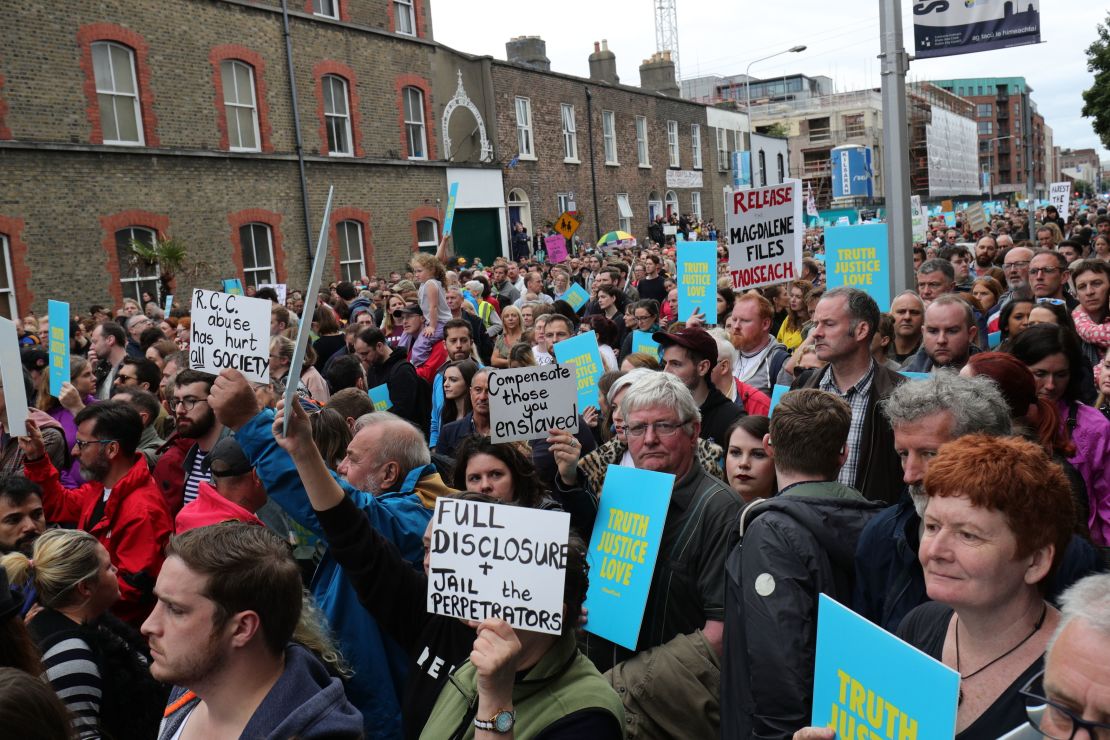
“I’m sure the Pope was sincere in his apology, but it needs to be followed up by action,” said Jenny Moore-Mcgowan, 47, holding a sign that read: “Apologies are not enough.”
“We can never, ever, ever have these abuses again in Ireland. The lives of people for generations were ruined, not just the people who were in the institutional schools, the Magdalene Laundries, the mother-and-baby homes, but their children and grandchildren. It ran right through this country like a virus.”
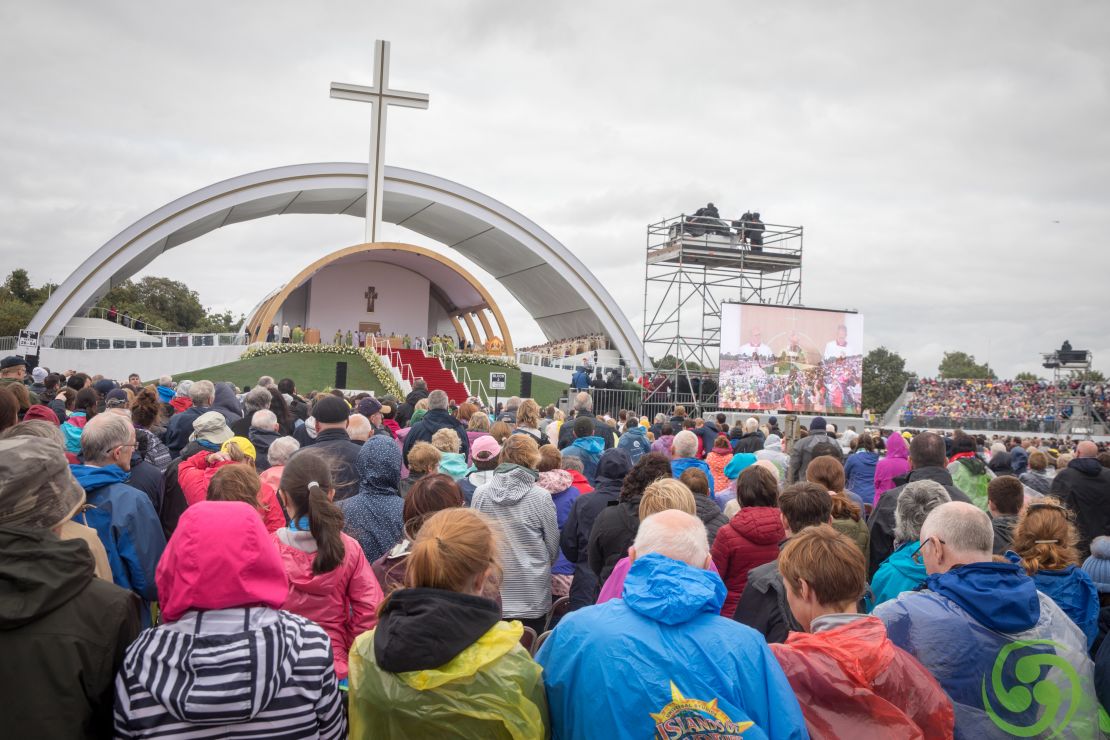
The Pope’s visit to Ireland came amid an intensifying outcry over a global clerical sex abuse crisis, following damning reports in the United States, Chile and Australia, detailing decades of institutional cover-ups. The revelations hung like a cloud over the trip, the first papal visit to the country since 1979, when Pope John Paul II was greeted here like a rock star.
In Temple Bar, a nightlife quarter packed with pubs, you wouldn’t know the Pope was in town, save for a few fluttering Vatican flags and shuttered streets. At one of the few papal souvenir stands in the city center, Paul Preston said he was having trouble selling merchandise.
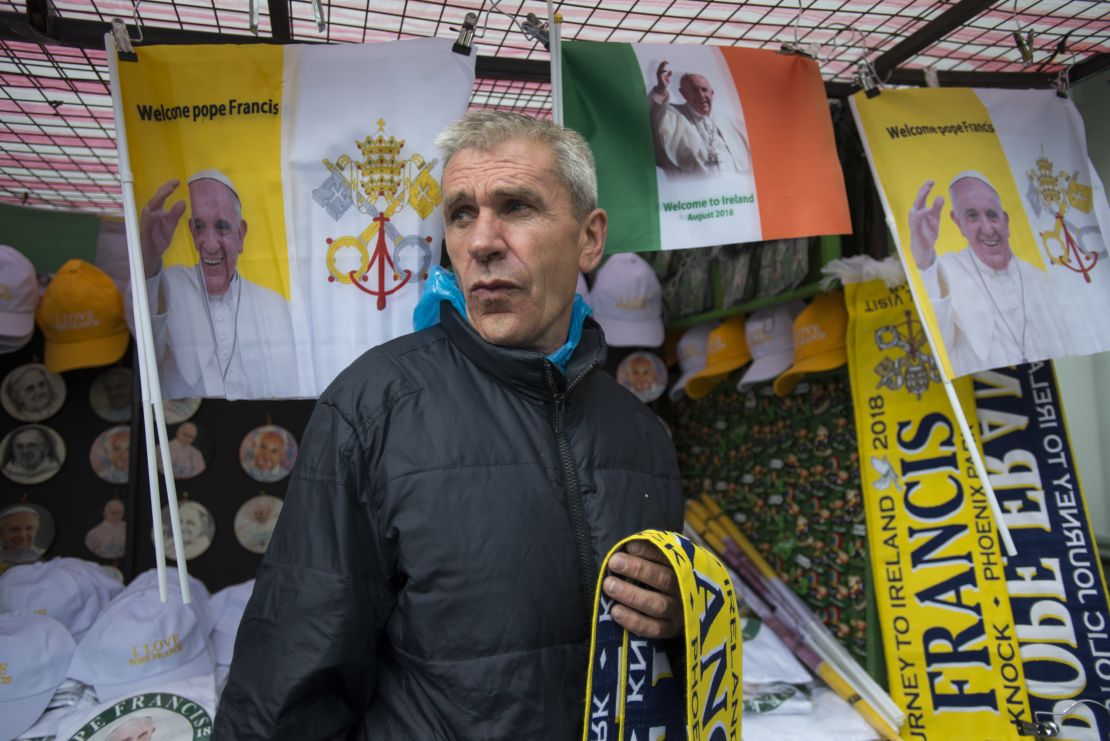
“People aren’t coming out to support the Pope in droves like they did in ’79. The church’s influence since then has gone kaput. People are disenchanted with all the controversies, all the sexual scandals.”
Forgiveness, but no solutions
Nearly four decades after John Paul II’s visit, Ireland is almost unrecognizable. It has broken from church teachings to legalize divorce, contraception, same-sex marriage, and just a few months ago, abortion. Leo Varadkar, the country’s first openly gay Prime Minister, gave an impassioned speech Saturday calling on the Pope to use his “office and influence” to bring about justice, truth and healing for victims and survivors.
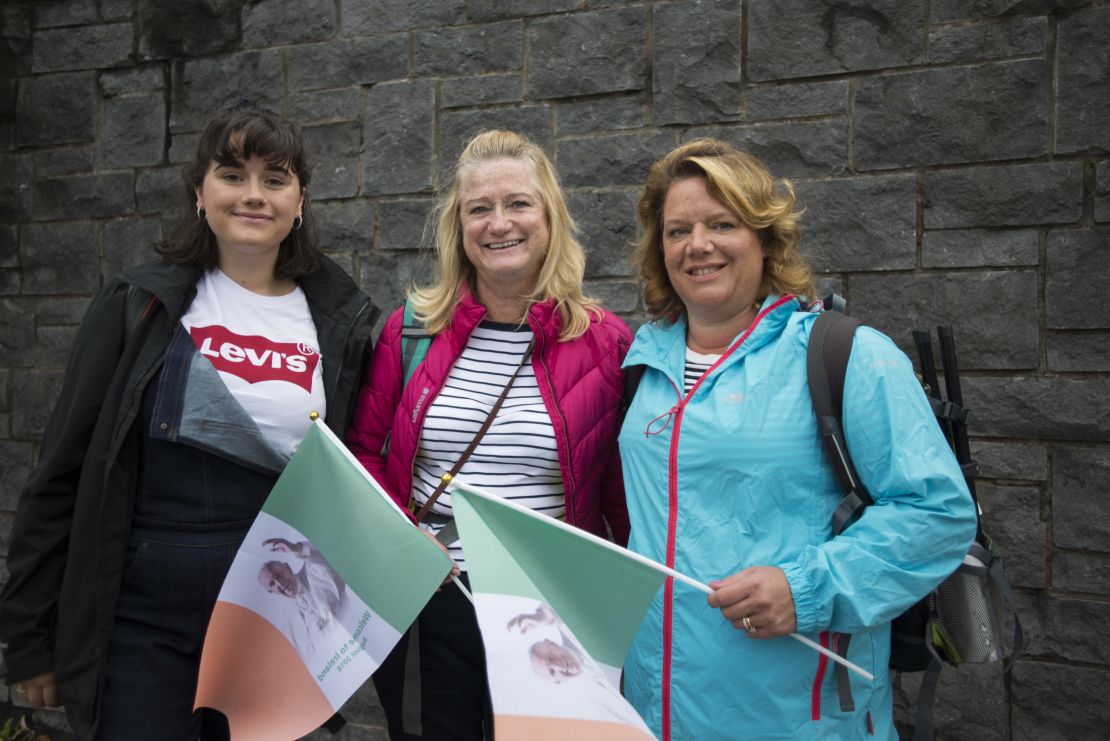
His forceful words were what many in Ireland had hoped to hear from Pope Francis himself during Mass.
“The Pope needs to take responsibility for the actions of his clergy,” said Aoibhin Meghen, a 19-year-old from the Dublin suburb of Dalkey, who attended Sunday’s Mass with her mother. “Although he hopefully hasn’t had any involvement in the abuse, he is the figurehead for the church, so it’s his responsibility to promise action and retribution for the people who have been wronged.”
Just hours before celebrating Mass, Pope Francis faced calls for his resignation from the former Vatican ambassador to Washington, who said the Pontiff did nothing about allegations of sexual abuse against the prominent Cardinal Theodore McCarrick, despite knowing about them in 2013.
Later, speaking to the press on his flight back to Italy from Ireland, Pope Francis said, “I will not say a single word on this,” although he added that after some time passes, “I may speak.”
The Pope told reporters he believes the statement from former Archbishop Carlo Maria Vigano speaks for itself. “I read the statement this morning, and I must tell you sincerely … read the statement carefully and make your own judgment,” the Pope said.
In his homily on Sunday, the Pope acknowledged “abuses of power and conscience” in Ireland, and asked for forgiveness for all the times the church did not provide survivors with compassion, justice, truth, or “concrete actions.”
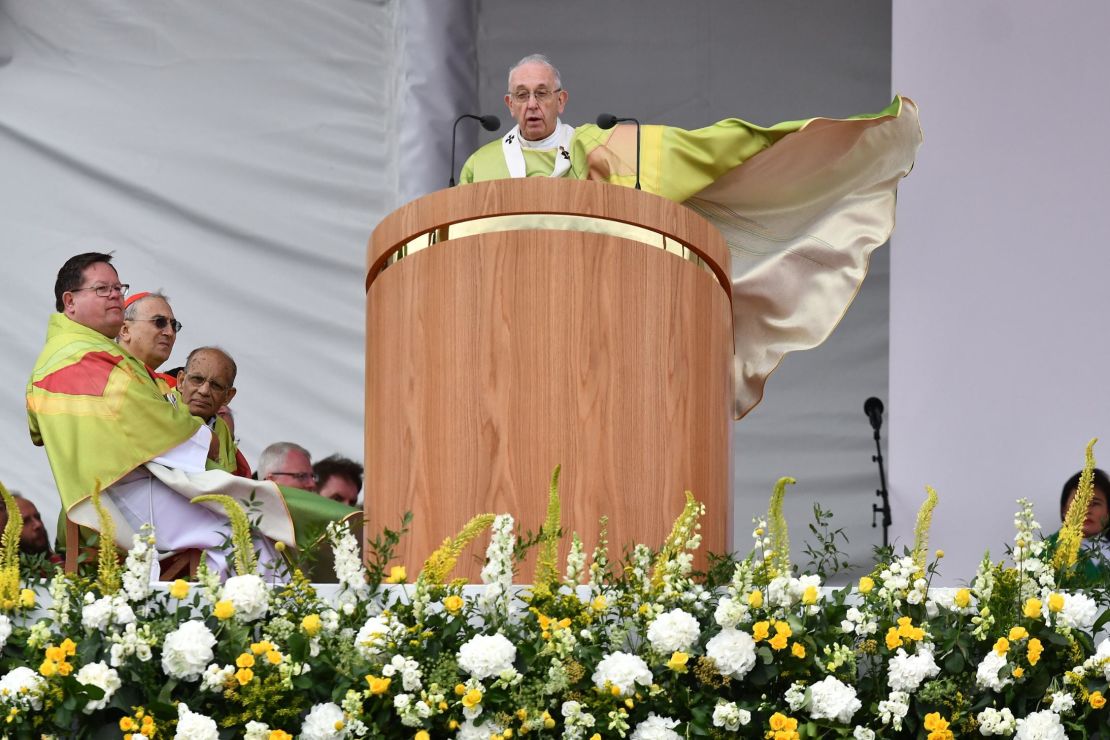
But still the Pontiff didn’t offer any specific solutions. And critics say he hasn’t gone far enough in articulating concrete steps to stop and punish abuses.
“Speak the truth. That’s what we’re asking for,” Hayley Brabazon, a 21-year-old from Dublin, said, calling on the church to come forward with the names of all priests disciplined over abuse. “It’s very simple, it all needs to come out. They need to speak the truth – the bishops, the priests, the Pope himself, who are protecting these monsters, they need to speak up. And it’s about time the Irish people stood up to them.”
A different Ireland
The same refrain was echoed by many protesters at the “Stand for Truth” rally, organized by Colm O’Gorman, a survivor of abuse who is now executive director of Amnesty International Ireland. About 5,000 people, including women’s rights groups, LGBTQ+ organizations, and abuse survivors, came out to stand in solidarity with those who have suffered under Catholic-run institutions in Ireland.
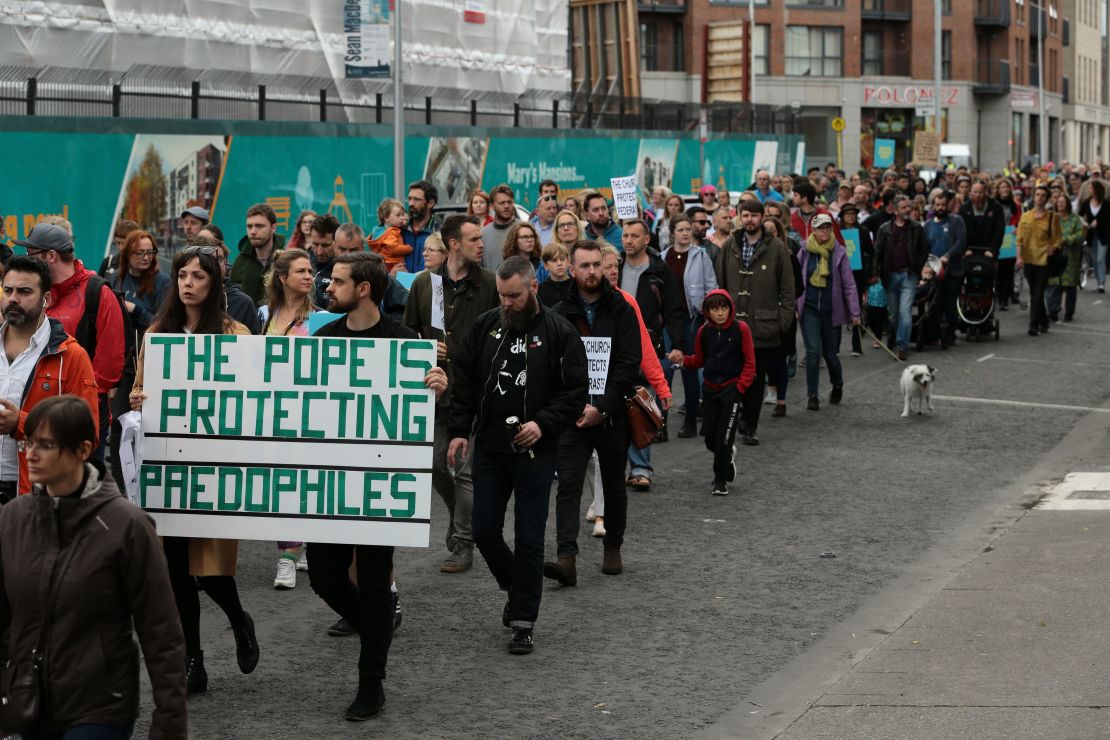
Ailbhe O’Rourke, 33, and Fionn Dally, 33, hung toward the back of the crowd holding a sign that read: “The Pope is protecting paedophiles,” written on the back of a repurposed sign from demonstrations to repeal the Eighth Amendment, a ban on abortion that was overturned in a referendum earlier this year.
“We’re hoping for a hat-trick. We passed marriage equality, legalized abortion, and now we’re hoping for separation of church and state,” Dally said, referencing the church’s power over the education system; approximately 90% of primary schools in Ireland have a Catholic ethos.
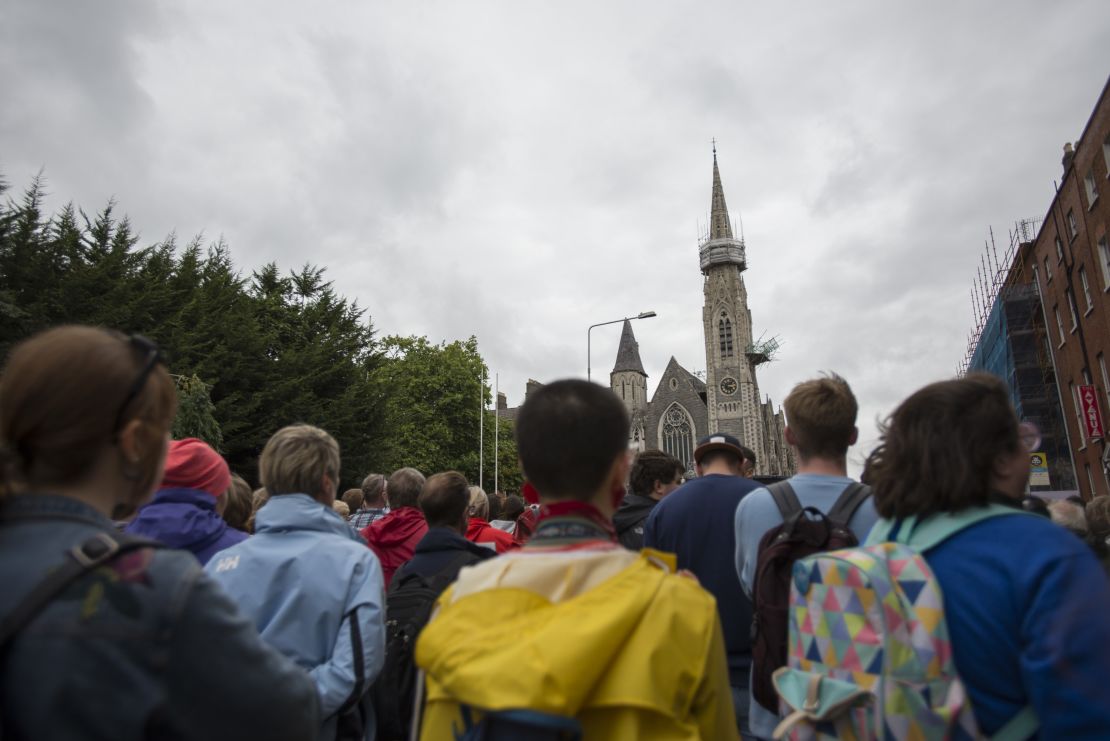
“The Ireland that welcomed John Paul in 1979 is not the same Ireland anymore. It’s completely changed. There are a lot of hurt people in this country,” O’Rourke said, wiping away tears. “After the changes we’ve seen bring so much joy, to have the Pope come here is just a slap in the face.”
As O’Rourke spoke, on stage, Belfast singer Brian Kennedy performed a rendition of a John Lennon classic with a new verse added: “Imagine there’s no pedophiles.” In a moment of levity, the crowd, which had been largely somber, broke into laughter and cheered, waving their placards aloft.



